Schole. Философское антиковедение и классическая традиция @classics-nsu-schole
Статьи журнала - Schole. Философское антиковедение и классическая традиция
Все статьи: 755
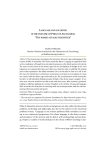
Language and laughter in the treatise of Philo of Alexandria “The Worse attacks the Better”
Статья научная
The present paper investigates the interaction between Logos and language in the treatise of Philo of Alexandria "The Worse attacks the Better". Language is regarded by Philo as the actualization of thought in its articulated expression, as the initial moment of creativity. The source of such action is the divine Logos, but the development of thought in the word happens in two opposite directions: one leads to joy, while the other, to suffering. The starting point of this separation is the initial orientation (love) of the mind to God or to self. In the first case, the mind in the act of utterance (expression) overcomes its own isolation. It comes into contact with the divine Logos and achieves joy. The crucial moment of this "leaving the brackets" of self individual thinking towards the light of the divine Logos is laughter. In another case, when the mind does not link words with their source, false creativity is produced, leading to suffering. Аpplying the concept of laughter to the doctrine of Logos and language, Philo reconciles the ideal plan of conceiving truth and its interpretation with the real functioning of the human mind and speech.
Бесплатно
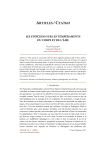
Les sto"iciens sur les temp'eraments du corps et de l’^ame
Статья научная
This article is concerned with the often neglected physical side of Stoic anthropology. The care for one’s soul is central to the Stoic notion of the art of living. Yet a special status is reserved for the human body—in spite of its being subsumed under the class of (preferred) ‘indifferents’. This status is explicable by reference to the fact that they regard the soul as a subtle kind of breath ( pneuma ) and hence as corporeal. As such, it is blended with the human body through and through. Care for the soul therefore involves care for the body. Furthermore, the Stoic view of the human organism entails a special interest in physiognomy. These interrelated aspects are studied against the backdrop of the relevant medical theories used by the Stoics.
Бесплатно
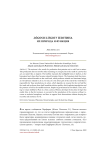
Logos и logoi у плотина: их природа и функция
Статья научная
Космос возникает не в результате деятельности творца, но согласно природе. Это возникновение не предполагает мышления или концептуализации, но является результатом действия силы, которая запечатлевает себя в материи. Ум сообщает умопостигаемые формы, которые в нем содержатся, гипостазированной Душе, в которой они превращаются в рациональные формулы (logoi). Затем Душа передает эти рациональные формулы мировой душе, которая порождает одушевленные и неодушевленные сущности, словно по указанию, полученному свыше. Однако, поскольку за порождение ответственна низшая часть мировой души, которая действует по своему разумению, возникшие в результате сущности уступают по качеству своему образцу, что объясняет несовершенство чувственно воспринимаемого космоса и наличие зла, несмотря на присутствующую в нем направляющую силу Промысла.
Бесплатно
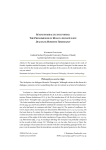
Magnum miraculum est homo. The phenomenon of man in asclepius sive dialogus hermetis trismegisti
Статья научная
The paper discusses anthropological and eschatological issues in the work of Pseudo-Apuleius entitled Asclepius, sive dialogus Hermetis Trismegisti. In this context, the issue of evil in the moral sense and the question of the sources of evil understood in this way are raised
Бесплатно
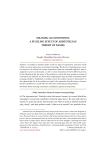
Meaning as convention: a puzzling effect of Aristotelian theory of names
Статья научная
According to Aristotle spoken words are signs of impressions, and those words which are used as names have conventional meanings. This theory of meaning poses a problem because it is unclear how exactly impressions which are essentially subjective may be assigned to names conventionally, i.e. due to certain interactions between different persons. In the following article the nature of the problem as well as the most prominent notions of conventions are analyzed: it is shown that considering the ways by which conventions about meanings should be established according to them the problem cannot be eliminated. It is also claimed that this is the problem not only for the particular Aristotle's theory of names, but also a problem for a much wider set of theories of meaning and interpretation.
Бесплатно
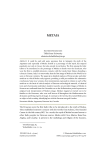
Статья научная
It could be said with some precision, that in Antiquity the myth of the Argonauts and especially of Medea herself as a personage of this myth, has enjoyed popularity not only in Greece but also outside its territories. The first among the Italic tribes to be introduced to the personage of Medea no doubt were the Etruscans, who were the first to establish intensive contacts with the Greeks from Euboea founding a colony in Cumae, Italy. It is noteworthy that the first image of Medea in the World Art is seen on Etruscan ceramics. The paper gives detailed analyses of Etruscan olpe and other artefacts on which Medea early appears, providing a solid precondition for substantive conclusions. Some new versions of an interpretation expressed in relation to each of the artefacts on the basis of critical analysis of Etruscan archeological material, of classical texts and of previously undertaken modern research, are provided. Images of Medea in Etruscan art confirmed from the Orientalist era to the Hellenization period represent an original, local interpretation of Medea's image. Medea's magical art turned out to be familiar to the Etruscans, who were well known all throughout the Mediterranean for divination and being experts of magic. In contrast to the Greeks, they turned Medea into an object of cult worship, identifying her with the Etruscan sun god Cavatha.
Бесплатно
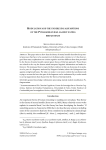
Modulation and the underlying assumptions of the pythagorean ban against eating broad beans
Статья научная
This paper tries to show that the theory of mental models describes deep mental processes that have to be assumed even by frameworks contrary to it. It has been argued that many explanations on certain cognitive activities different from that provided by the theory of mental models cannot ignore theses of this last approach. Those theses are related to the way the human mind interprets linguistic information and makes inferences. The main goal here is to give further evidence in this way by means of an analysis of a part of a fragment, authored by Diogenes Laërtius, about the Pythagorean ban against eating broad beans. The idea is to make it even more evident that any framework trying to account for how that part of the fragment can be understood by a reader needs to accept suppositions that characterize the theory of mental models.
Бесплатно

Статья научная
We know that Modus Tollendo Tollens is a difficult rule to apply. We also know that there are circumstances in which people easily use it. One of those circumstances is whenever the conditional premise is an obligation conditional. On the other hand, the Stoic criterion of the conditional, that is, the proposal Chrysippus of Soli gave for the latter logical connective, has been related to Non-Axiomatic Logic and Inheritance Logic. My aim here is to try to show that obligation conditionals can be deemed as deontic inheritance statements in Non-Axiomatic Logic or Inheritance Logic. I will attempt to argue that it is possible to build a deontic inheritance logic with two essential characteristics. First, it respects the Stoic criterion of the conditional. Second, in consistence with the literature, it leads to the conclusion expected by classical logic when the conditional is an obligation.
Бесплатно
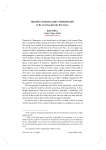
Monist and dualist tendencies in Platonism before Plotinus
Статья научная
The article by John Dillon (Trinity College, Dublin) is devoted to an interesting page in the history of adventure ideas. It traces the path made by metaphysics of the platonic sense from the "moderate monism" of Plato and the Ancient Academy, through the dualism of Plutarch and Noumenia, to the monistic position of Plotinus. Rus. trans. of this article, see ΣΧΟΛΗ ΙΙ. 1 (2008) 11-20.
Бесплатно
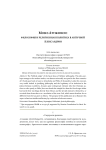
Moses Attikidzon: философия и религиозная политика в античной Александрии
Статья научная
“Библейское происхождение” основных идей эллинской философии. Эта идея, возможно, странная для современного читателя, была практически общепринятой в первые века нашей эры и восходит, по крайней мере, к Аристобулу и Филону Александрийскому. Одним из основных протагонистов этой концепции, действительно очень полезной для оправдания философии и обоснования правомерности включения ее в иудейско-христианское мироучение, следует считать Климента Александрийского, который не сомневается в том простом факте, что греческие мудрецы или позаимствовали свои учения непосредственно от самого Моисея и иудейских служителей, или же получили его свыше как откровение истинного Бога, которое поэтому не должно отличаться от закона, данного Моисею. Статья дополняется подборкой источников, иллюстрирующих историю перевода Библии на греческий язык.
Бесплатно
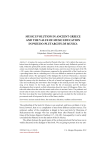
Music evolution in ancient Greece and the value of music education in pseudo-Plutarch's "De Musica"
Статья научная
A treatise De musica, ascribed to Plutarch (the 2nd c. AD), reflects the music evolution from the beginning of this art in archaic Greece until the early Hellenistic period. Initially, within the spiritual life and the education of the citizens the importance of music education was extremely high. Gradually, during the years, and even since the last part of the 5th c. BC, music, after centuries of dominance, appeared in the spiritual life of the Greeks not as a prevailing feature but as a subsiding one. It was even difficult to maintain its position in the educational system. The participants of the dialogue (the rich host Onesicrates, a musician Lysias and an educated man Soterichus) have been gathered to discuss, investigate and highlight the reasons why this decadence of the role of music has happened, by citing the musicians and recollecting the innovations they brought in the musical practise since the beginning of its history. In the book, apart from the list of musicians and the technical developments they invented, we find information about the views of Pythagoras, Plato, Aristotle and others about the value that music used to have in ancient Greece. The paideutic and moral value of music was the reason why it played a very important role in the education and the three men adopt the most traditionalistic approach and conclude that the technical improvements made it lost ground in favor of the literary studies.
Бесплатно
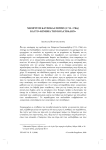
Neophytos Kausokalybites (1713-1784?) kai to "Kinema ton kollybadon"
Статья научная
Leonidas Bargeliotis (Athens) presents the essay "The Neofit Kafsokalivit (1713-1784?) And the movement of the collovads." As you know, this movement arose among the monks of Mount Athos who stood up for the protection of church customs and against those members of the "brethren" who wanted to earn money by selling their goods on the Saturday market and increasing the number of memorial services paid for by parishioners, agreeing to spend them on Sunday and holiday days. The neophyte was one of the protagonists of this movement, and to evaluate his role, the author of this article (1) gives an outline of the philosophical and theological conflicts of that time, (2) explores the religious rhetoric that accompanies the conviction of the monk Neophyte and his stubborn self-defense, and (3) shows the importance permanent relocations of the Neophyte for wide dissemination of the discussion in the Balkans and beyond.
Бесплатно
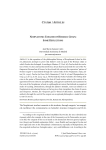
Neoplatonic Exegesis of Hermaic Chain: Some Reflections
Статья научная
In his exposition of the philosophical history of Neoplatonist School in Athens, Damascius attempts to prove that Isidore's soul was part of the Hermaic chain to which Proclus also belonged. According to Marinus (V. Procl. 28), Proclus had the revelation of this very fact and had learned from a dream that he possessed the soul of the Pythagorean Nicomachus of Gerasa. In the 4th and 6th centuries the expression “pattern of Hermes Logios” is transmitted through the various links of the Neoplatonic chain, Julian (Or. 7.237c), Proclus (in Parm. I.618), Damascius (V. Isid. Fr. 16) and Olympiodorus (in Gorg. 41.10.16–22; in Alc. 190.14–191.2). The formula that Aelius Aristides (Or. III.663) dedicates to the praise of Demosthenes, the best of Greek orators, arises in the context of an opposition between rhetoric and philosophy, and appears transferred and transmuted in the texts of the Neoplatonic schools to a philosophical context that defends an exegetical mode of teaching. Demosthenes, through his admirer Aristides, exerts an influence on Neoplatonism, introducing Hermes as the key piece that strengthens the chain of reason and eloquence. Hermes, the “eloquent” god or “friend of discourses”, transmits divine authority through the word of the exegete: an exceptional philosopher, a model of virtue to strive to rise to.
Бесплатно
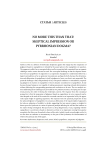
No more this than that: skeptical impression or Pyrrhonian dogma?
Статья научная
This is a defense of Pyrrhonian skepticism against the charge that the suspension of judgment based on equipollence is vitiated by the assent given to the equipollence in question. The apparent conflict has a conceptual side as well as a practical side, examined here as separate challenges with a section devoted to each. The conceptual challenge is that the skeptical transition from an equipollence of arguments to a suspension of judgment is undermined either by a logical contradiction or by an epistemic inconsistency, perhaps by both, because the determination and affirmation of equipollence is itself a judgment of sorts, one that is not suspended. The practical challenge is that, independently of any conceptual confusion or contradiction, suspending judgment in reaction to equipollence evinces doxastic commitment to equipollence, if only because human beings are not capable of making assessments requiring rational determination without believing the corresponding premises and conclusions to be true. The two analytic sections addressing these challenges are preceded by two prefatory sections, one laying out the epistemic process, the other reviewing the evidentiary context. The response from the conceptual perspective is that the suspension of judgment based on equipollence is not a reasoned conclusion adopted as the truth of the matter but a natural reaction to an impression left by the apparently equal weight of opposing arguments. The response from the practical perspective is that the acknowledgment of equipollence is not just an affirmation of the equal weight of arguments but also an admission of inability to decide, suggesting that any assent, express or implied, is thrust upon the Pyrrhonist in a state of epistemic paralysis affecting the will and the intellect on the matter being investigated. This just leaves a deep disagreement, if any, regarding whether equipollence is an inference based on discursive activity or an impression coming from passive receptivity. But this, even if resolved in favor of the critic (which it need not and ought not be), is not the same as confusion or inconsistency on the part of the Pyrrhonist, the demonstration of which is the primary aim of this paper.
Бесплатно
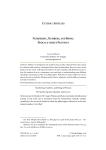
Numbering, Numbers, and Being: Proclus versus Plotinus
Статья научная
Plotinus’ investigation into numbers has peculiar characteristics that cannot be confused with numbers’ ontological role in late Neoplatonism. However, since, in his inquiry on the nature of Being and numbers, Proclus explicitly calls Plotinus into question, the analysis of such a comparison can contribute to understanding some different speculative assumptions of the two philosophers. With this in mind, I will focus on two issues: the role accorded by Plotinus and Proclus to arithmetic, and the different ontological rank of numbers.
Бесплатно
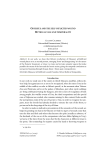
Odysseus and the self-inflicted wound mythical tale and temporality
Статья научная
In our work, we show that Helen's recollection of Odysseus' self-inflicted wound places us in an eternal present, emerging "from" and disappearing "in" the nature of the Homeric hexameter, et retour , to create and recreate semantic spaces that make possible the return of the hero and the heroic action, giving the temporal correlation an unexpected meaning through the past-future / future-past correspondence.
Бесплатно
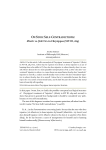
On stoic self-contradictions: vs. in Chrysippus (SVF III, 289)
Статья научная
In this article, I offer an analysis of Chrysippus’ treatment of “injustice” (ἀδικία) in SVF III, 289. First, I show that he espouses two theses: I) Every injustice is an act of harming those who suffer it; II) One who does injustice to others thereby does it to oneself. Then I discuss the two most plausible interpretations of II): a) One who does “conventional” injustice to others, i.e. causes them non-moral harm, thereby does “moralistic” injustice to oneself, i.e. makes oneself morally worse; b) One who does “moralistic” injustice to others thereby does it to oneself. I show that a) is untenable because the Stoics reject the very notion of non-moral harm, and b) fails because they believe that moral harm is basically self-regarding.
Бесплатно
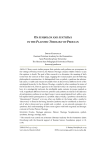
On symbolon and synthema in the platonic theology of Proclus
Статья научная
Many recent studies propose that symbolon and synthēma are synonymous in the writings of Proclus. However, his Platonic Theology contains reliable evidence to put this opinion to doubt. The goal of this research is to determine the meaning of both terms from the contexts of their usage, engaging the textual analysis and the following philosophical reconstruction. As distinguished from a symbol, a synthēma has substantial nature, is stable and remains invariable when is discovered at different levels of the ontological hierarchy. In the Platonic Theology, a symbol is often considered in terms of the hierarchic level, where it appears: in the material world, it is corporeal; among numbers, it is ontologically irrelevant, the intelligible realm contains its proper symbols as well. A significant difference between symbolon and synthēma is related to the dialectics of participation: synthēma in an object keeps it on an unparticipated level, while a symbol implies further participation to a symbolic object. Finally, a synthēma is described as “disseminated,” “planted,” or in any other way hidden in the being; while a symbol is “discovered,” or found in the being, therefore synthēma may be considered an inner kernel of what is discovered as a symbol, and a symbol - as an outward expression of a synthēma. Such understanding of these terms agrees with both exegetical and theurgic contexts in Proclus' Platonic Theology.
Бесплатно
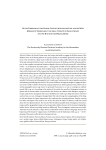
Статья научная
Before the Greek-Persian wars, the Ionians had tried to engage the Hellenic states of the Balkan Greece in the flaring advance of a group of poleis in Asia Minor against the Persian rule, the Ionic revolt resulted in a large-scale (within the ancient world) conflict between the East and the West and unleashed a half-century’s confrontation between the Hellenes and the Achaemenid Empire. In the complex international situation shaped at the turn of the 5th century BC in the Hellenic world — in its European and Asian parts — strong poleis needed not only military power but also the art of diplomacy to maintain their steadfast stance. In the second half of the 6th century BC the states of the Eastern part of the Aegean Sea frequently tried to involve Spartans in their affairs and exploit their military power in fighting Persians. Herodotus gives accounts of several such attempts: Hdt. 1.82–83; 1.152; 3.46–47 and 54–56; 3.148; 5.49–51 and 97; 6.84. Aware of the ‘enormity’ of the Persian wars in the world history, Herodotus chose a topic of a Homeric scale to be accounted of epically. His historical ad ethnographic text is made up of various myths, yarns, legends, anecdotes and amusing and edifying short stories. The tyrant of Miletus Aristagoras sought to engage the Spartans in the conflict with the Persians by using peculiar bronze tablet (khalkeos pinax), which was an archaic geographic proto-map meant to persuade Cleomenes to set out on a dangerous military march (Hdt. 5.49–50). According to the author of the article, the novella of Aristagoras’ mission in Sparta and the bronze tablet are presented in the Histories as a drama: with dialogues, urgings, attempts made by the protagonist (the tyrant of Miletus) he tried to get King Cleomenes interested and win him over, yet, Aristagoras’ designs failed. The role of Gorgo, the young daughter of the King, in this mini-drama is of great importance: she condemns the cunning petitioner, thereby rescuing her father and Sparta. This must be one of the tales that the Father of History could have heard about the wise Spartan Queen. The moral of the Herodotus’ parable about Aristagoras, Cleomenes, Gorgo and the ‘geographical map’ can be interpreted as follows: beware of the Ionians bringing fake tablets. But in Athens everything turned out differently. There Aristagoras’ mission was successful. Athenians sent the Ionians 20 ships, which, as Herodotus writes in Homer’s language, became “the beginning of the disasters” (arkhe kakov) of all Hellenes and the barbarians (Hdt. 5.97.3) — the beginning of the great conflict between Europe and Asia.
Бесплатно

On the meaning of the term symbol in the writings of Plutarch of Chaeronea
Статья научная
Plutarch of Chaeronea was a prominent Middle Platonist, influential both in early Christian Platonism and in pagan Neoplatonic schools. One of the significant markers of this succession is an increasing interest in symbolism and terminological usage of the term symbol. As Plutarch provided almost no explicit theory of symbolism, this research focuses on the contextual word usage in his writings, its analysis and reconstruction of Plutarchian symbolism in the philosophical milieu of his time. Plutarch understands symbol as a two-level entity, which combines an ordinary object or object-related action with a signification of some other entity that is absent, invisible or otherwise imperceptible, so a symbol points to it or acts instead of it. Unlike signs, symbols are ambiguous and may have multiple meanings. Moreover, the polysemanticism of a symbol is considered its strong advantage that reveals the ontological profundity of the symbolized entity. Symbols may appear odd and amazing, thus provoking philosophical inspiration in a person trying to decipher them. Along with single symbols, Plutarch provides examples of integral symbolic systems, among which he mentions human languages. Finally, symbols may be not only passive pointers or reminders but also actors, which influence human decisions and deeds. Plutarch provides a detailed description of the way daemons use symbols as a means to induce mortals to make correct choices. The general pattern of Plutarchian symbolism can be compared with similar conceptions of Clement of Alexandria, Porphyry of Tyre, and Iamblichus of Chalcis.
Бесплатно

